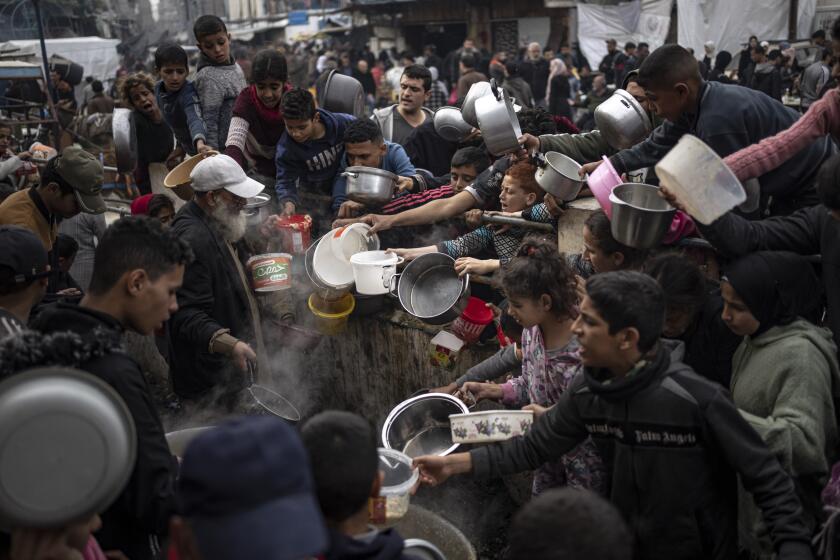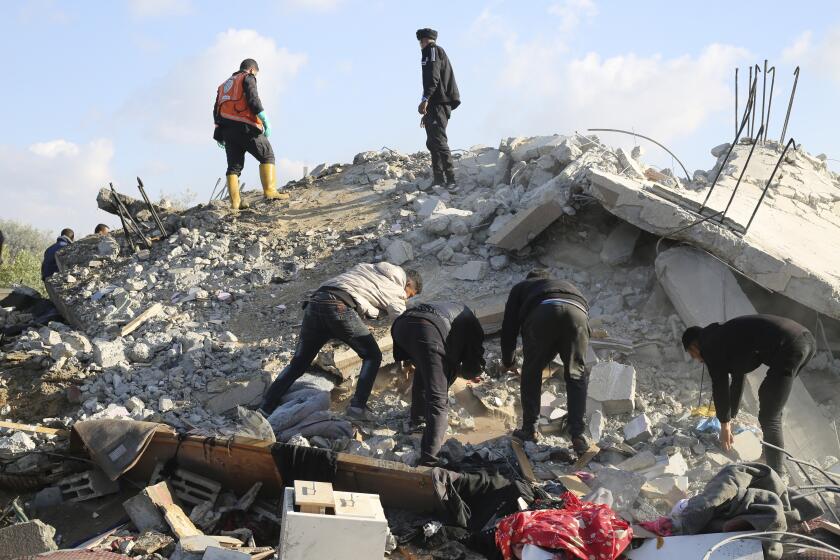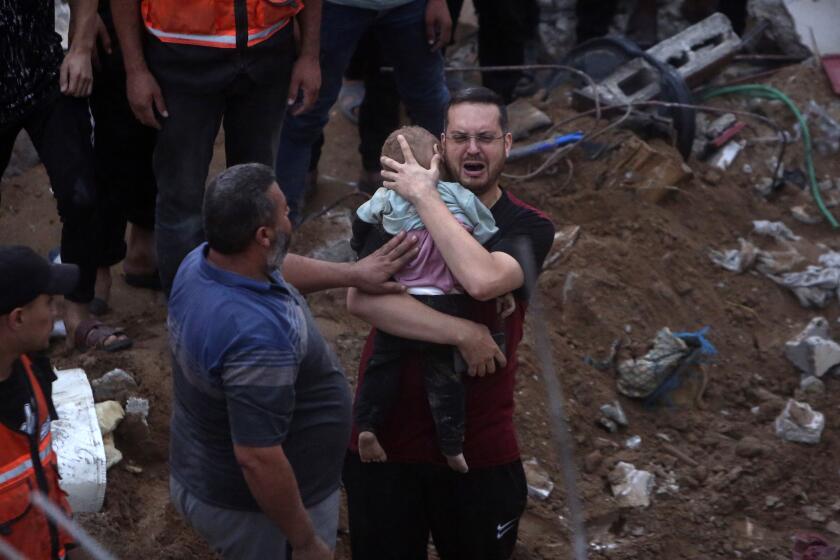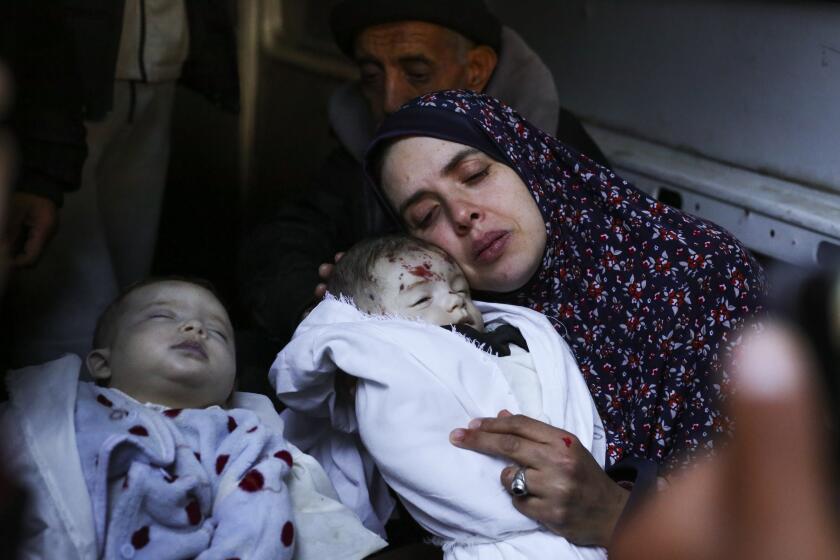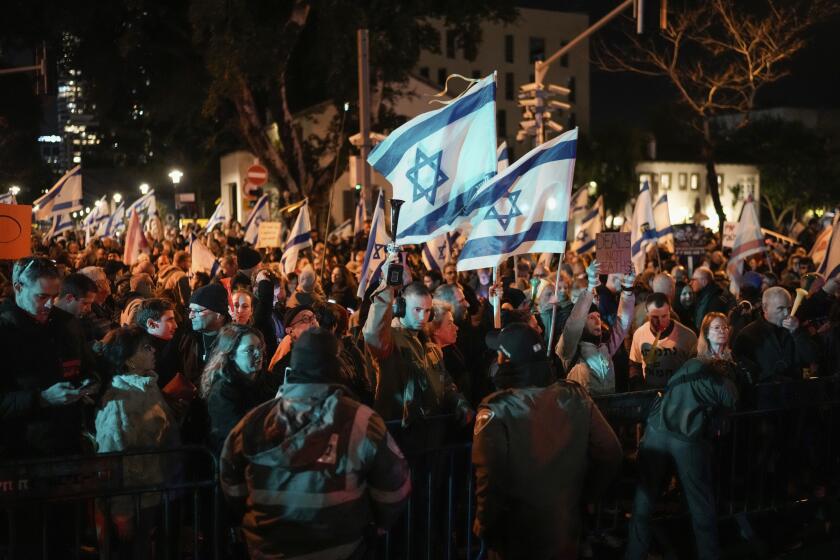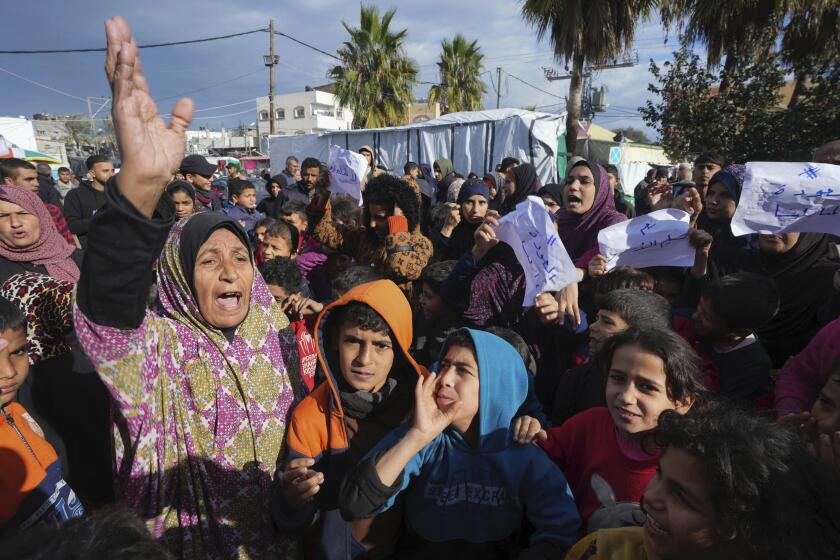An Israeli airstrike in Gaza kills 3 sons and 4 grandchildren of top Hamas leader
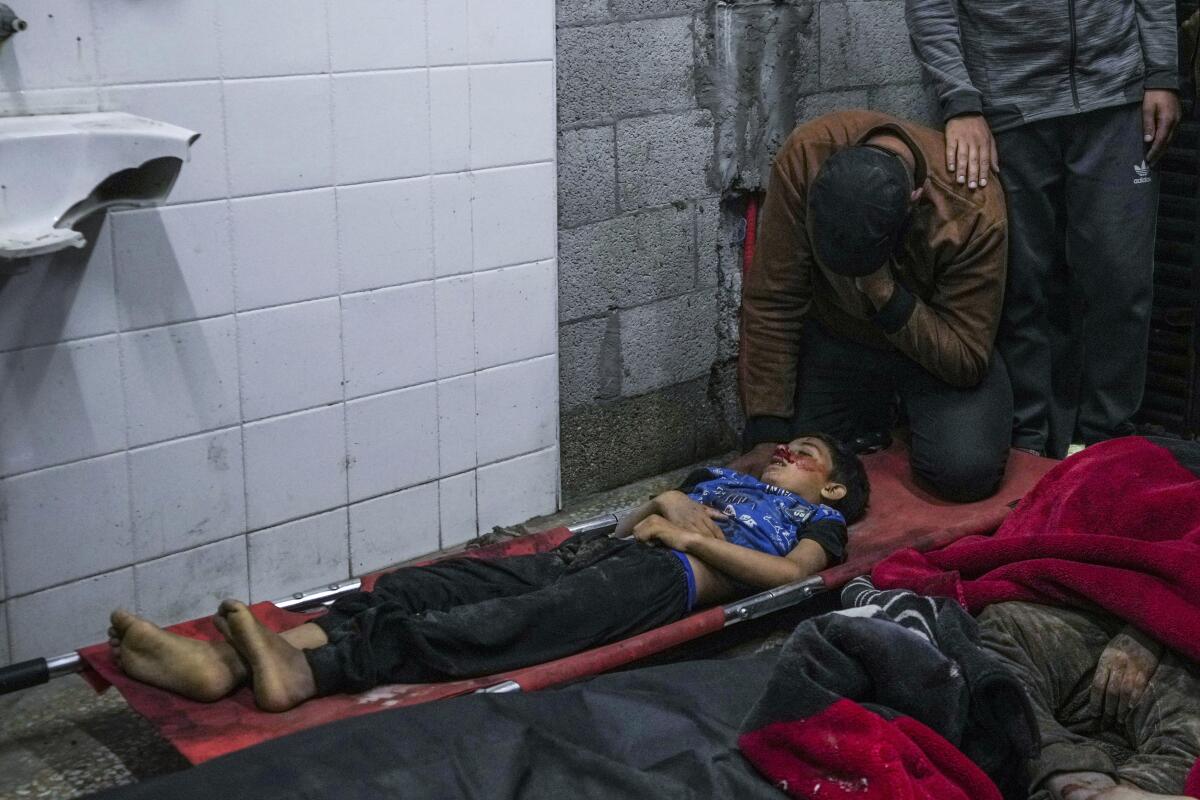
- Share via
TEL AVIV — Israeli aircraft killed three sons of Hamas’ top political leader in the Gaza Strip on Wednesday, striking high-stakes targets at a time when Israel is holding delicate cease-fire negotiations with the militant group. Hamas said four of the leader’s grandchildren were also killed.
Ismail Haniyeh ’s sons are among the highest-profile figures to be killed in the war so far. Israel said they were Hamas operatives, and Haniyeh accused Israel of acting in “the spirit of revenge and murder.”
The deaths threaten to strain the internationally mediated cease-fire talks, which appeared to gain steam in recent days even as the sides remain far apart on key issues.
The slayings also come as Israel is under intensifying pressure — increasingly from its top ally, the U.S. — to change tack in the war, especially when it comes to humanitarian aid for desperate people in Gaza.
Israel said many of the dead were trampled in a stampede for the food aid and that its troops only fired when they felt endangered by the crowd.
Haniyeh said Hamas would not cave to the pressure leveled by the strike on his family.
“The enemy believes that by targeting the families of the leaders, it will push them to give up the demands of our people,” Haniyeh told the satellite channel Al Jazeera. “Anyone who believes that targeting my sons will push Hamas to change its position is delusional.”
Hamas’ Al Aqsa TV station aired video of Haniyeh receiving the news of the deaths through the phone of an aide while visiting wounded Palestinians who have been transported to a hospital in Qatar, where he lives in exile. Haniyeh nodded, looked down at the ground and slowly walked out of the room.
Al Aqsa TV said Hazem, Ameer and Mohammed Haniyeh were killed in the strike near the Shati refugee camp in Gaza City, where Ismail Haniyeh is originally from. Hamas said three of Haniyeh’s granddaughters and a grandson were also killed. Hamas did not disclose their ages.
The brothers were traveling with family members in a single vehicle targeted by an Israeli drone, Al Aqsa TV said.
A hospital official and AP journalists say Israeli airstrikes have killed at least 44 Palestinians in the southern Gaza city of Rafah.
The Israeli military said Mohammed and Hazem were Hamas military operatives and that Ameer was a cell commander. It said they had conducted militant activity in the central Gaza Strip, without elaborating. It did not comment about the grandchildren killed.
The strike on Haniyeh’s family is the latest bloodshed in a war with no end in sight.
Earlier, Israeli war Cabinet minister Benny Gantz claimed Hamas has been defeated militarily, although he also said Israel will fight it for years to come.
“From a military point of view, Hamas is defeated. Its fighters are eliminated or in hiding” and its capabilities “crippled,” Gantz said in a statement to the media in the southern Israeli city of Sderot.
But he added: “Fighting against Hamas will take time. Boys who are now in middle school will still fight in the Gaza Strip.”
Human Rights Watch says an Israeli strike on an apartment building in Gaza last October killed at least 106 civilians, including 54 children.
Gantz reiterated the Israeli government’s commitment to go into Rafah, the city at the far southern end of the Gaza Strip where more than half the territory’s 2.3 million people are now sheltering.
For Palestinians, the strike on Haniyeh’s family darkened an already grim Eid al-Fitr holiday, which ends the holy fasting month of Ramadan. Palestinians marked the holiday by visiting the graves of loved ones killed in the war. In the Jabaliya refugee camp near Gaza City, people sat quietly by graves surrounded by buildings destroyed by Israel’s offensive, which was launched in response to the deadly Hamas attack on Oct. 7.
As misery in Gaza lingers, Israel has faced increasing pressure, including from its own top ally, the U.S., to change tack in the war, especially in regard to the delivery of humanitarian aid.
On Tuesday, President Biden called Prime Minister Benjamin Netanyahu’s handling of the war in Gaza a mistake and urged his government to flood the beleaguered territory with aid. He repeated that call again Wednesday, saying the efforts to boost aid were “not enough” and demanding another entry point for trucks in northern Gaza.
Rania Abu Anza was staying with extended family in Rafah with her husband and five-month-old twins when an Israeli strike destroyed the home.
Gantz said Israel would soon open a new crossing to serve hard-hit northern Gaza, an early target in the war.
After months of supporting the war against Hamas, the White House has ramped up pressure on Israel to reach a cease-fire and taken a sterner line that has rattled the countries’ decades-old alliance and deepened Israel’s international isolation over the war.
The most serious disagreement has been over Israel’s plans for an offensive in Rafah. The rift was worsened by an Israeli airstrike last week on an aid convoy that killed seven workers with the World Central Kitchen charity, most of them foreigners. Israel said the deaths were unintentional, but Biden was outraged.
Biden’s latest comments highlight the differences between Israel and the U.S. over humanitarian aid to people in Gaza, where the war has led to warnings of imminent famine for more than a million people.
“What he’s doing is a mistake. I don’t agree with his approach,” Biden told Spanish-language broadcaster Univision when asked whether Netanyahu was prioritizing his political survival over Israel’s interest.
Key mediator Qatar says talks on a potential cease-fire deal in Gaza ‘have not been progressing as expected’ in the last few days.
Israel halted aid deliveries to Gaza in the early days of the war, but under U.S. pressure has slowly increased the number of trucks allowed to enter the territory.
Still, aid groups say supplies are not reaching desperate people quickly enough, blaming Israeli restrictions and noting that thousands of trucks are waiting to enter Gaza. Countries have attempted less efficient ways to deliver aid, including airdrops and by sea.
Israel says it has opened up more entry points for trucks to enter, especially for northern Gaza. Israel also accuses aid groups of being too slow to deliver aid once it’s inside Gaza.
Aid groups say logistical issues and the precarious security situation — underscored by the strike on the aid workers — complicate deliveries.
Netanyahu has vowed to achieve “total victory,” pledging to destroy Hamas’ military and governing capabilities to prevent a repeat of the Oct. 7 attacks and to return hostages captured by Hamas and others that day. He says that victory must include an offensive in Rafah.
While Gazans hold Israel principally responsible for their suffering, many also blame Hamas for not foreseeing the consequences of its Oct. 7 attack.
Israel launched the war in response to Hamas’ cross-border assault in which militants killed about 1,200 people, mostly civilians, and took roughly 240 people hostage, according to Israeli authorities.
More than 33,400 Palestinians have been killed in the relentless fighting, according to Gaza’s Health Ministry, which doesn’t differentiate between civilians and combatants in its count but says most of the dead are women and children. Israel says it has killed some 12,000 militants, without providing evidence.
The war has ignited a humanitarian catastrophe. Most of the territory’s population has been displaced and with vast swaths of Gaza’s urban landscape leveled in the fighting, many areas are uninhabitable.
Goldenberg, Shurafa and Chehayeb write for the Associated Press. Shurafa reported from Deir al Balah and Chehayeb from Beirut. AP writer Josef Federman in Jerusalem contributed to this report.
More to Read
Sign up for Essential California
The most important California stories and recommendations in your inbox every morning.
You may occasionally receive promotional content from the Los Angeles Times.
